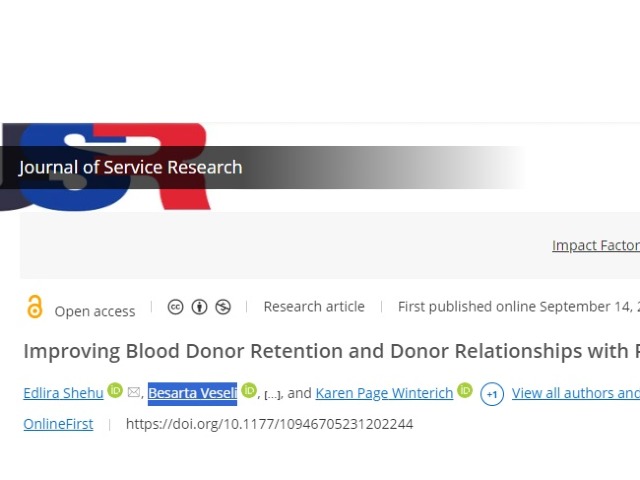Open access publication in the spotlight (December) - 'Improving Blood Donor Retention and Donor Relationships with Past Donation Use Appeals'

Each month, the open access team of the University of Groningen Library (UB) puts a recent open access article by UG authors in the spotlight. This publication is highlighted via social media and the library’s newsletter and website.
The article in the spotlight for the month of December 2023 is titled Improving Blood Donor Retention and Donor Relationships with Past Donation Use Appeals, written by Edlira Shehu (Professor at the Faculty of Economics and Business ), Besarta Veseli, Michel Clement (both from the University of Hamburg) and Karen Page Winterich (Pennsylvania State University).
Abstract
Blood donation services seek new strategies to improve donor relationships and increase donor retention. In this study, we propose a novel strategy that employs appeals with feedback on the use of blood donors’ past donations. We theorize that this feedback increases the perceived relationship investment and, subsequently, the quality of the relationship with the blood donation service, thereby increasing redonations. An online experiment shows the positive effect of past donation use appeals on donation intention and transmission through perceived relationship investment and relationship quality. Three field studies with Red Cross Blood Donation Services confirm the effectiveness of past donation use appeals on redonation behavior compared with thank-you appeals and with a future donation use appeal. Past donation use appeals are effective for retention purposes, especially for more experienced donors and when sent shortly after the donation. Such appeals also lead to higher reactivation rates of inactive donors. In addition to having practical implications, the study contributes to the relationship and nonprofit service literature.
We asked first and corresponding author Edlira Shehu a few questions about the article:
You cooperate a lot with organizations outside academia (like charities, but also industry partners). How important is open science, in particular open access to scientific publications, for such collaborations?
I strongly believe in the significance of open science and open access to scientific publications. This is not only crucial for potential industry collaborations but also essential for making research accessible to industry partners. From my experience, the key is to articulate the core of the research and its implications in a way that industry stakeholders can comprehend. In my collaborations, the initial step to capture an industry partner's interest is to convey the relevance and potential impact of a research idea, showing how it can help improve and shape future decisions and strategies. So, yes, I believe open science is highly valuable, and it's crucial for young researchers to develop effective communication skills to share their research comprehensively with a broader audience, and make it accessible to a wider public.
You mention in the article that after conducting the field studies, the Austrian Red Cross Blood Donation and German Red Cross Blood Donation Services adopted this strategy of past donation use appeals. Is the strategy proving successful?
The Austrian Red Cross adopted the strategy following our presentation of results from the German Red Cross study. It has become the standard communication approach at the Austrian Red Cross, and our paper demonstrates its success. However, there is ongoing research, particularly on the long-term effects of this strategy, which we are actively exploring in a follow-up project.
The societal impact of the research described in this article is potentially very high. Can you explain why?
The societal impact is very high because blood can save lives, but it cannot be produced artificially. So, without blood donors, there is no blood supply. And blood is in constant demand. In the U.S., every two seconds, someone needs blood, platelets or both, according to the American Red Cross. The situation in Europe is similar. Because not everyone who is eligible to give blood ever donates, there are periodic shortages, which have become more frequent due to the pandemic, or climate-driven situations. Consequently, it is important to identify strategies that help motivate donors’ future donation intentions. Telling them that their last donation was used helps increase future donations, helping thus to potentially save more lives. We saw in our studies that giving donors information that their past donation was used increases donations by more than 10%.
You previously worked in Germany and Denmark, before joining the Faculty of Economics and Business as Professor of Digital Marketing in February this year. Have you noticed differences in the adoption of open science between these countries?
In my experience, universities are increasingly embracing open science, encouraging faculty to share and make their research more accessible to the public. A notable initiative at the Copenhagen Business School, where I previously worked, was the 'book a scientist' day. Faculty members could present their research topics, and interested companies could 'book' them for a talk. In Groningen, we benefit from a robust support network for publishing research findings through press releases. This level of support is something I appreciate, and have not necessarily encountered in other institutions I've been a part of.
Could you reflect on your experiences with open access and open science in general?
For me, it's crucial that my research goes beyond academic significance to have managerial relevance and a real-world impact. This emphasis on open science is a principle I emphasize with the PhDs I supervise. Collaborating with companies or nonprofits may demand extra effort due to project setup, coordination, and communication. However, the resulting higher quality and impact of the research make it a worthwhile investment in the end.
Useful links:
Interested in becoming a blood donor? Go to the Sanquin website for more information and to register as a donor.
Citation:
Shehu, E., Veseli, B., Clement, M., & Winterich, K. P. (2023). Improving Blood Donor Retention and Donor Relationships with Past Donation Use Appeals. Journal of Service Research. https://doi.org/10.1177/10946705231202244
If you would like us to highlight your open access publication here, please get in touch with us.


